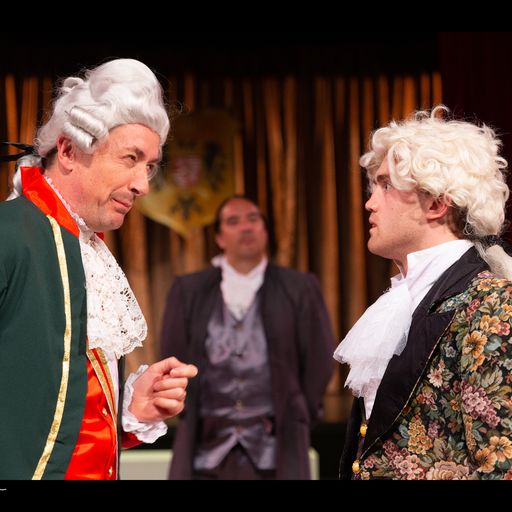Rob Croser’s production of “Amadeus” for Independent Theatre pays homage to all music sublime. Whether constructed by the touch of genius or devised by a lesser talent, we celebrate music as a necessary, integral part of our lives. It fuels celebration, imagination, reflexion and ultimately peace and serenity. The first night audience members were on board with all of the above and their diligent concentration was well rewarded.
Costuming by Sandra Davis and Angela Doherty was befitting and splendid. Sound was pleasingly clear with cues spot-on throughout. Whilst lighting was generally okay I felt that there were times when action or actors were underlit. Croser’s use of devices such as frieze and silhouette was an effective tool, and, in the scene with Mozart in creative conductor mode, it reinforced the composer’s innate ability to simply conjure music.
The Venticelli (Lachlan Williams and and Andre Vafiadis), opened the play as the prattling court chorus. Exhibiting a well rehearsed working relationship, their quick-fire observations and stream of information were always delivered in a rapid but succinct and digestible manner. David Roach’s Salieri was introduced as a decrepit creature wallowing in self-deprecation, obsessed with his role in contributing to Mozart’s death several decades earlier. David’s Iago-like demeanour and mellow vocal qualities were ideally suited to his portrayal of Salieri. No embroided handkerchief here but a growing library of exquisitely scored music by Mozart both seduced and haunted him. He invited us to return to the Court of Emperor Joseph II and set about recreating the time spent there with Mozart and other contemporaries. He was self appointed story teller, the “ringmaster” of this wondrous musical circus. The role of Salieri, who was onstage at all times, is a challenging one. David had a number of stumbles and pauses to pick up lost lines, and that caused momentary dips in continuity and momentum. However the first night audience was patient and understanding. There was nothing lost by way of levels of interest and involvement in the proceedings. David was well supported by the energetic stagework of the diverse characters of the court of the Holy Roman Empire of the 18th Century.
Chris Bleby, as Emperor Joseph lent an air of regality to his role. He was a monarch of few words, pithy pronouncements and quick exits. He was sufficiently enlightened (apparently!) to insist that one of Mozart’s musical scores had too many notes! Chris invested him with a harmless regal authority in a nicely delivered cameo.
Courtiers Chamberlain Strack (Julie Quick), Baron von Swieten (David Rapkin) a diplomat and music patron, and Count Orsini-Rosenberg (who insisted on excising pages depicting a peasant dance sequence) and played with pompous relish by Matt Hein were all nicely obsequious to the Emperor but variously askance concerning the presence, obvious talent and potential influences of Mozart.
Mozart and his wife Constanze were a playful couple given to crude cavorting and puerile games. Kate Owen as Constanze was a faithful and loving supporter of her husband. She was brazen and forthright yet retained the good manners of her courtly status. She was a most likeable character.
Ben Francis was the consummate Mozart and invested his character with a convincing liberal touch of the musical savant. His physicality maintained a frantic momentum and rhythm throughout the play. He commanded our attention and we believed in the ease of his genius. A fine performance indeed.
“Amadeus” is a fascinating play with its sophisticated dialogue accompanied with samples of sublime music. We are transported to a time of composer genius and the visit is delightful. There it is!
Photo: Jacqui Munn



